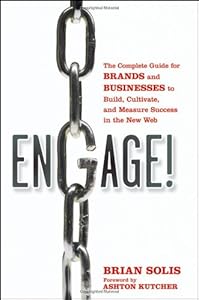I have been thinking about this question for some time. I have been thinking that there is something wrong with all the titles I see that begin with Reach and Engage for numerous articles and blog posts. To me at least, it seems that in the social age the terms Reach and Engage cancel each other out. One can make an educated argument that reach belongs in the push column of marketing. Whereby engage can be placed in the pull column.
Therein lays, perhaps, the problem with this expression of reach and engage. Organizations and marketers have been wired for decades in reach and push strategies. The structure of businesses has remained surprisingly constant despite significant transformative changes occurring during the past two decades. There is a built-in inertia and interwoven into corporate DNA is the push mentality. It has always been about pushing, reaching, and “going to” a segment or a market. In several recent articles, I have discussed this notion of buyer behaviors that reject reach and push and how organizations today must become listening organizations that foster engagement.
Brian Solis published an article entitled The End of Social Media 1.0. While the focus is on social media and consumers, some points apply to buyer behavior and this question. Brian notes that organizations today must learn to listen with social media and consumers want to be heard. He further states that social media must become an extension of active listening and engagement. Currently social media is in the grips of marketing which has always been, along with sales, the beholders of reach and push. Brian makes a case for social media belonging to an active listening social enterprise. We are dealing with a century of organizations that are built on the silos that support the reach, push, and got-to pillars. Redesigning organizations to become a social enterprise is definitely going to be no small feat.
A funny thing happened on the way to the social media forum. It is no longer about tweets, likes, and constancy of social media which is resulting in social media fatigue. We may be seeing the beginnings of the next evolution in the social age – the evolution becoming about buyer behavior orienting towards wanting to be heard and wanting intelligent engagement. If so, this has some serious ramifications for organizations and their relationships with buyers. It flips the enterprise upside down, flattens it, and forces the enterprise to listen. The competitive advantage may very well come from those organizations willing to stomach such a transformation earlier than most.
Companies today will need to examine what is meant by reach and engage and whether it fits new buyer behaviors that want listen and engage. Do their efforts in content marketing and sales, for example, mirror conventional reach and push through the different channels of social networks? Are their efforts just about maintaining a presence? Is their presence merely an extension of reach and push – or – are they truly listening and engaging? It looks like organizations today are faced with some profound questions. To answer such questions, organizations and their leaders will need to undergo the deepest self-examination they’ve had to do in quite some time.
What do you think? Engage.




